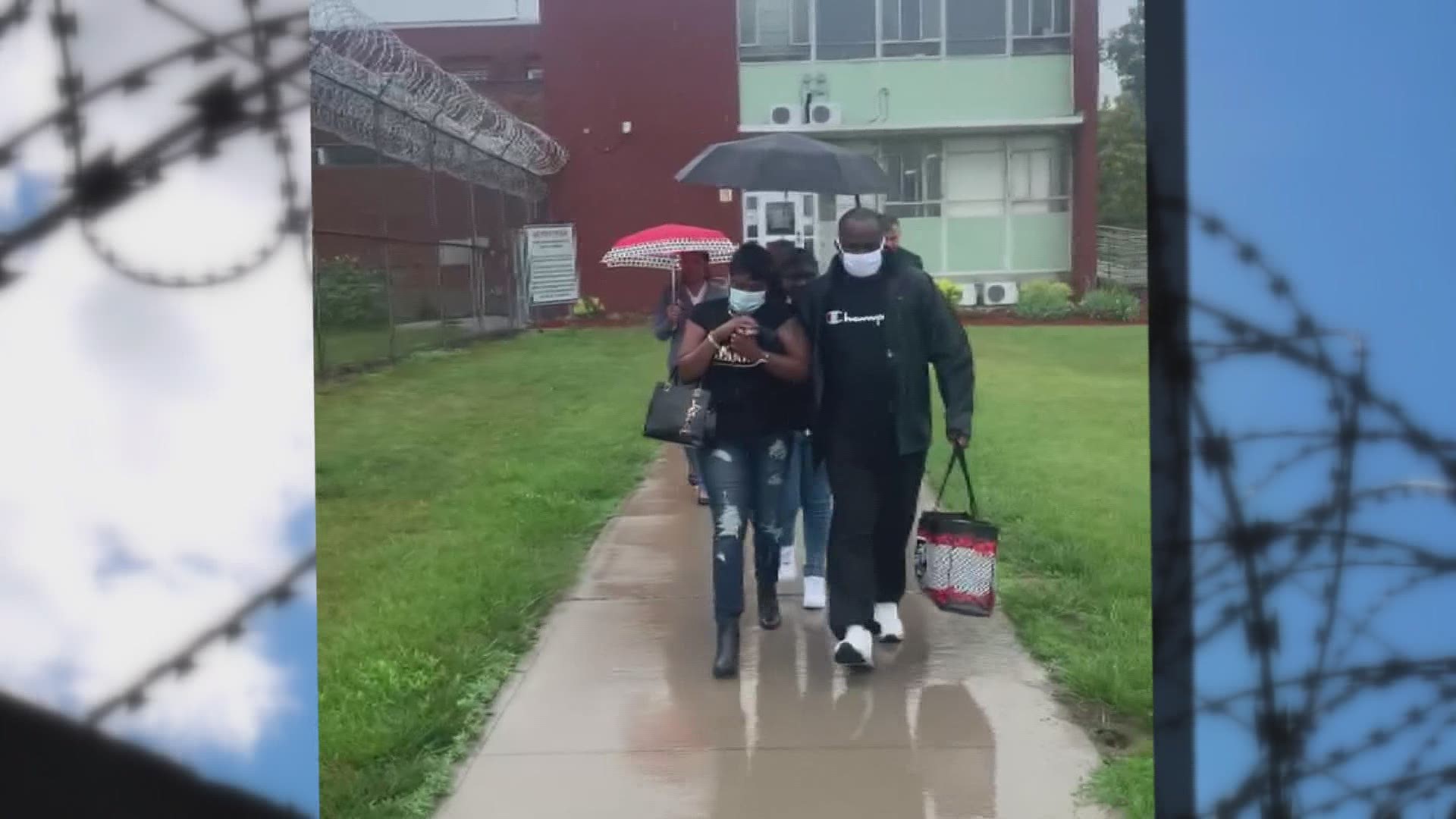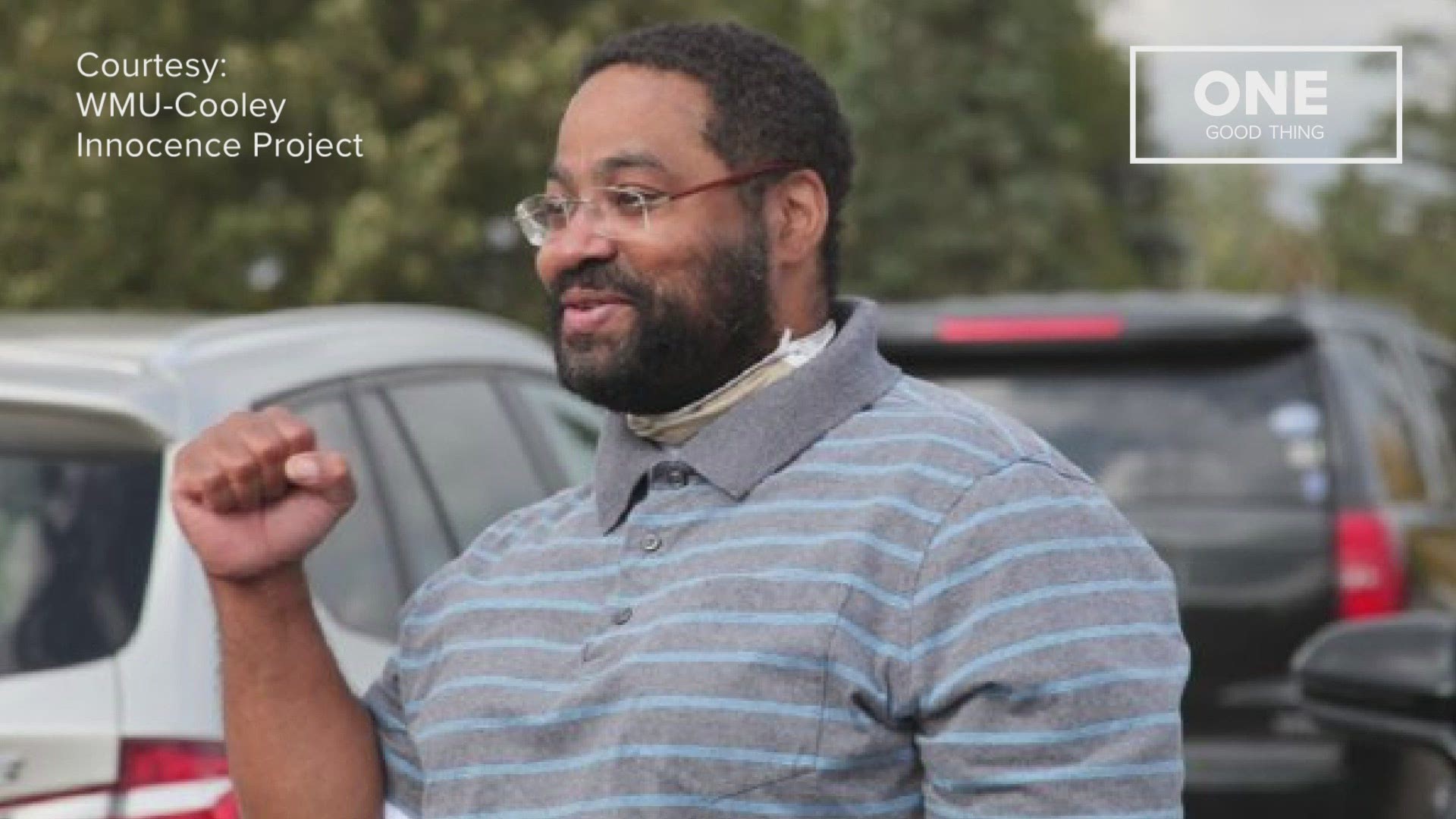IONIA, Mich. — It was an emotional day in Ionia Friday as friends, family, and law officials welcomed home Corey McCall, a man who had been incarcerated since 2005.
The 39-year-old from Benton Harbor, was serving a life sentence without the possibility of parole at the Michigan Reformatory. But after 16 years, his convictions of murder were dismissed and he was released from the facility.
McCall was welcomed home with a picnic at the Bertha Brock Park shortly after his release
"I feel good," said McCall. "It's been a long time, it's been hard, and I'm glad I'm here."
In 2005, McCall was given a life sentence for shooting and killing three people, including a 12-year-old boy. He was just 23 years old.
"Doing time in prison for something you didn't do," said McCall, "it tends to wear on your mind, and mess with your psyche."
"You have to build yourself up to come back to reality," he added.
McCall's case was reexamined by Attorney General Dana Nessel's 'Conviction Integrity Unit and the WMU Cooley Law School Innocence Project.
New evidence exonerated McCall after more than a decade behind bars.
"We're very, very excited to have Corey free after so many years," said Michigan Attorney General Dana Nessel, "after spending year after year after year in prison for a crime he didn't commit."
Attorney General Nessel stood alongside McCall and his family Friday, happy to have helped give him his life back.
"Sometimes justice isn't just convicting guilty people, it's freeing the innocent," Nessel said.
Corey McCall said he doesn't hold any anger, he just always knew he couldn't give up hope.
"You can't be angry, and you can't hold onto grudges," he said. "You've just got to live and let go, and go on with your life."
McCall is newly engaged and said he is excited to restart his life outside of prison.
His fiancé is excited too, but said it has been a long journey.
"Our son will be 20 years old in a few months," said fiance Regina Martin, "and he grew up without his dad."
"They can't get that time back, and he can't get that time back," added Martin.
McCall could be eligible for $50,000 from the state for every year spent in prison.
"Hope fades sometimes if you let it," said Corey McCall. "But you've got to fight through it and everything will be alright."
You can read more about McCall's case below.
The Berrien County conviction of Corey Quentin McCall, 39, has been vacated after collaboration between the Michigan Department of Attorney General's Conviction Integrity Unit (CIU), the Berrien County Prosecutor's Office, the Benton Harbor Department of Public Safety, and the Western Michigan University Cooley Law School Innocence Project (Cooley Innocence Project). McCall was wrongfully convicted of three counts of murder and one count of attempted murder in 2005. New evidence, including forensic evidence, discovered during CIU's investigation exonerates him after nearly 16 years in prison.
Berrien County Circuit Court Judge Angela M. Pasula set aside the conviction Friday morning during a hearing held via Zoom.
After the Department of Attorney General formed the CIU, the unit received new information indicating that McCall was not responsible for the events that led to his convictions. CIU special agents then investigated the credibility of the new evidence. This led to a statewide collaboration to investigate McCall's innocence.
The Benton Harbor Department of Public Safety, led by Director Daniel McGinnis, Jr., and the Berrien County Prosecutor's Office collaborated with CIU special agents to review the previous investigation and pursue new leads. Director Daniels was the officer in charge at the time of McCall's arrest and charging in 2005. The Cooley Innocence Project partnered to help determine whether DNA testing could help identify the true perpetrators.
Following this investigation, the CIU, led by Assistant Attorney General Robyn Frankel, and Berrien County Prosecutor Steven Pierangeli, moved to have McCall's convictions vacated and requested dismissal of all charges.
"The exoneration of Mr. McCall is an example of the importance of a collaboration between multiple agencies," Nessel said. "When I established the CIU, I envisioned our office working side-by-side with local prosecutors and police departments to uncover the truth. I commend the attorneys and investigators in my office, the local agencies, and the WMU-Cooley Innocence Project for their hard work in ensuring justice for Mr. McCall"
Berrien County Prosecutor Pierangeli stated, "It goes without saying that it is tragic Mr. McCall has served any time in prison for this crime. Prosecutors in Berrien County make every effort to prevent this from occurring. In this case, Mr. McCall was convicted when the perpetrators of the crime had information of his innocence and waited until recently to disclose it. I fully recognize, however, that setting aside the conviction cannot begin to adequately compensate Mr. McCall for what he has lost. Nothing can restore his lost youth or return to him the years he spent in prison."
CASE BACKGROUND
On March 26, 2005, four armed men broke into a house and killed three people and shot a surviving victim during a robbery in Benton Harbor. The surviving victim eventually identified McCall as one of the gunmen after seeing his profile during the robbery for 1-2 seconds.
At trial, McCall presented an alibi defense that he was purchasing items at Walmart when the crime occurred. Trial testimony from Walmart employees was that those purchases were not made that night, discrediting McCall's statements and contradicting his alibi. McCall was ultimately convicted by a jury.
Decades later, the CIU received new information that McCall did not participate in the crime. This new information led to the discovery of new witnesses and new evidence, including documents that were not available at trial, that demonstrate McCall's innocence. The Benton Harbor Department of Public Safety helped to forensically analyze a phone that corroborated the new evidence. The CIU did pursue DNA testing, but the crime scene evidence was not material to the identity of the perpetrators.
"Mr. McCall's exoneration was made possible by the incredible work of the Attorney General's Conviction Integrity Unit and the willingness of the Berrien County Prosecutor to vacate his convictions when presented with clear and convincing evidence of his innocence," Tracey Brame, the director of the Cooley Innocence Project, said. "The Cooley Innocence Project is proud to play a role in this exoneration, and I'm hopeful that this partnership with the CIU will result in justice for others who are wrongfully convicted."
At the age of 23, McCall was sentenced to serve life without parole on December 5, 2005.
In 2019, the Department of the Michigan Attorney General received a grant from the Department of Justice to partner with the Cooley Innocence Project to screen claims of innocence and conduct DNA testing. That same year, the Cooley Innocence Project received a separate grant from the Department of Justice to partner with the Department of the Michigan Attorney General in reviewing cases in which unreliable forensics played a role in the conviction. These grant partnerships were instrumental in McCall's investigation and release.
Exonerated prisoners are eligible for up to a year of reentry housing and two years of other supportive services offered by the MDOC. These include job placement assistance, job training, transportation assistance, work clothing or tools, vital documents assistance and more.
Exonerees are presented information on these services when they are released and can access them within two years of their release.
To date, the CIU has received more than 1,300 requests for assistance.
►Make it easy to keep up to date with more stories like this. Download the 13 ON YOUR SIDE app now.
Have a news tip? Email news@13onyourside.com, visit our Facebook page or Twitter. Subscribe to our YouTube channel.


